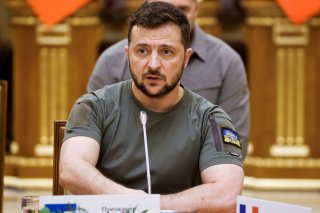Why Did Zelensky Deny Ordering the Crimea Bridge Strike?
Zelensky’s denial is contradicted by a previous statement from Ukraine’s commander-in-chief of the armed forces.
Ukrainian president Volodymyr Zelensky denied on Wednesday that his government had been involved in the explosion on the Crimean Bridge separating the Crimean Peninsula, which Russia invaded and annexed in 2014, from mainland Russia.
“We definitely did not order that, as far as I know,” Zelensky said during an interview with Canada’s CTV television network.
The attack on the bridge, which took place on October 8, killed three Russian civilians and destroyed the segment of the bridge leading from Russia to Crimea. The explosion also lit a passing railway car on fire, although the bridge’s rail line was later restored to limited service.
It is still unclear how the bridge was attacked, and various observers have speculated that a missile strike, a truck bomb, or a naval bomb might have caused the damage. The Russian government has claimed that the Ukrainian military organized the attack, smuggling explosive materials into Russia and assembling a truck bomb inside the country for use on the bridge. The Kremlin has arrested at least eight people, including five Russian citizens, in connection with the alleged plot, although Kyiv has denied it took place.
The Ukrainian government had previously denied similar attacks, such as a strike against a Russian air base and fuel storage facility in Crimea. In the aftermath of that attack, Ukraine’s Defense Ministry jokingly speculated that a Russian soldier had accidentally ignited the blasts through careless smoking, an explanation that has since become a meme among pro-Ukrainian social media users. Gen. Valery Zaluzhny, the commander-in-chief of Ukraine’s armed forces, later acknowledged that Ukraine had launched the strike on the air base.
While the Ukrainian military has not taken responsibility for the bridge attack, several Ukrainian officials have nonetheless celebrated it, and the Ukrainian postal service issued a stamp commemorating the incident within hours of its announcement. When two pro-Russian activists prank-called Ukrainian foreign minister Dmytro Kuleba posing as former U.S. ambassador to Russia Michael McFaul, the Ukrainian diplomat “privately” acknowledged that Ukraine had launched the bridge strike.
Construction began on the Crimean Bridge in 2015, and it was formally opened by Russian leader Vladimir Putin in 2018. Sometimes known as the Kerch Bridge after the Kerch Strait it crosses, the bridge is the longest in Europe, and the Kremlin has framed its construction in ideological terms, citing it as a symbol of Russian-Crimean unity.
Trevor Filseth is a current and foreign affairs writer for the National Interest.
Image: Reuters

